Morning Pages 101: What They Are, How They Work, and Why Writers Swear by Them
There’s something powerful about beginning your day with a blank page and a pen.
Before your phone lights up. Before your to-do list kicks in. Before you start making decisions or responding to anything. Morning Pages help you return to yourself before the noise begins.
If you’ve heard people talk about Morning Pages but haven’t been sure what they actually are, or if the idea of writing every morning sounds either intriguing or impossible, this post is for you. We’ll walk through what they are, how they work, and why they matter, especially for writers who feel stuck, scattered, or overwhelmed.
What Are Morning Pages?
Morning Pages were created by author Julia Cameron as part of her book The Artist’s Way. At their core, they are a daily writing practice meant to help you clear your mind and reconnect with your creativity.
Here’s what the process looks like:
- Write three full pages by hand
- Do it first thing in the morning
- Let the writing be stream-of-consciousness with no editing or planning
You’re not writing a journal entry, an essay, or a polished paragraph. You can write about how tired you are. What you dreamed. What you’re anxious about. What’s bothering you. What you need to remember to do later. There is no right or wrong content. The only rule is to keep going until you fill three pages.
Why Morning Makes a Difference
This isn’t about being a morning person. It’s about writing before the rest of your day shapes your thoughts.
In the morning, your mind is still untangled. You haven’t yet answered emails or reacted to notifications. You haven’t started performing or solving problems. Writing during this early window gives you more direct access to your unfiltered thoughts. Think of it like cleaning out a cluttered drawer. Morning Pages help you get the mess out of your head so you can start the day with more clarity and intention.
What Morning Pages Are Not
To understand the value of Morning Pages, it helps to know what they are not.
- They are not a traditional journal. You’re not documenting your life or trying to capture memories.
- They are not meant to be read by anyone else. Not even you, at least not right away.
- They are not creative writing. You don’t need a good idea or a perfect sentence. That’s not the goal.
Morning Pages are not about results. They are about showing up. They give you a way to stay in motion even when you feel blocked, distracted, or unsure what to write.
How Morning Pages Help Writers
If you’re someone who writes, or wants to write more often, Morning Pages can make a real difference.
1. You practice writing without pressure
This is a space where no one expects anything from you. No feedback. No outcomes. Just a daily chance to be present with your own thoughts. Over time, this helps reduce fear and perfectionism in other areas of your writing life.
2. You unlock ideas you didn’t know you had
Without a plan or outline, you might be surprised by what shows up. New characters. Emotions you’ve been ignoring. A topic you want to explore. Morning Pages often surface truths or patterns that have been waiting for your attention.
3. You build creative consistency
Even when you don’t feel like writing your main project, Morning Pages keep you in the habit of returning to the page. That consistency creates momentum and helps you stay connected to your creative work, even when motivation is low.
4. You create a deeper connection with your voice
Since you’re not writing for anyone else, there’s no need to perform or polish. You begin to trust your raw, unfiltered thoughts and notice what really matters to you.
How This Practice Supports Your Mind
Morning Pages can also serve as a form of emotional grounding. You don’t need to make sense of everything before you write. You simply notice what is present and give it space to exist on the page.
Writers often use Morning Pages to:
- Release mental clutter
- Process feelings that are hard to articulate
- Identify what’s draining or distracting them
- Reconnect with their personal goals or intentions
- Start the day with a calmer, more focused mindset
This is especially helpful when life feels noisy or overwhelming. Morning Pages don’t solve everything, but they create a space where you can think clearly and move forward with more self-awareness.
How to Get Started
You don’t need anything fancy to begin. Just a notebook and a pen.
Here are a few gentle tips to help you begin the habit:
- Choose a notebook you enjoy writing in. It helps if it feels personal and inviting.
- Try to write by hand. This slows down your thoughts and helps you connect more directly to what you’re thinking.
- Keep your pages private. Don’t plan to share them or revise them.
- Don’t worry if your writing feels boring or repetitive. That’s part of the process.
- Stay with it even if you miss a day. This is a practice, not a rule.
There is no need to write anything profound. You can begin with whatever is on your mind.
Why This Practice Lasts
Morning Pages work because they are low-pressure and adaptable. They do not require inspiration, energy, or a plan. They only require your presence.
This is not about writing something useful or beautiful. It’s about returning to the page again and again, no matter what mood or mindset you bring with you. Some days your pages will feel aimless. Some will surprise you. Most will land somewhere in the middle. What matters is that you showed up.
The habit creates a safe place for your thoughts. Over time, that kind of consistency builds confidence and trust, both in your writing and in yourself.
From my writing desk to yours,
Stephanie
Recent Posts

The Tale of Genji: The World’s First Novel and the Woman Who Wrote It

Morning Pages 101: What They Are, How They Work, and Why Writers Swear by Them

